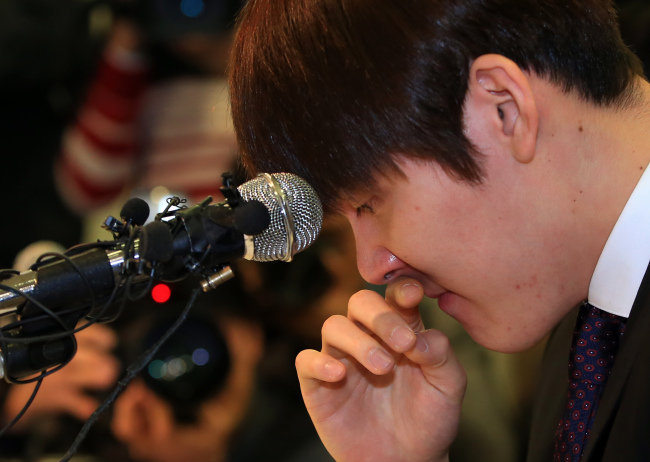Disgraced South Korean Olympic swimming champion Park Tae-hwan on Friday apologized to the public for his recent doping scandal, saying he was ashamed of himself for letting down so many people.
Park held a press conference at a Seoul hotel, his first public appearance since FINA, the international swimming federation, handed down an 18-month suspension Monday after he‘d tested positive for testosterone, a substance banned by the World Anti-Doping Agency.
FINA collected Park’s samples on Sept. 3 last year and his suspension began retroactively on that day.
It will end on March 2, 2016.
 |
| Suspended Olympic swimming champion Park Tae-hwan holds a press conference to apologize for his doping violation in Seoul on Friday. The Korean received an 18-month suspension and his eligibility for the next Olympics is in jeopardy. (Yonhap) |
Park, a national icon who remains the only South Korean with an Olympic swimming gold, had previously argued that a Seoul-based doctor had given him an injection without fully disclosing that it could contain a banned substance.
The doctor was later indicted on charges of professional negligence and will stand trial next month.
On Friday, the 25-year-old took full responsibility for the positive test.
“I‘d like to apologize to the people for causing so much trouble with this unacceptable incident,” Park said, fighting back tears as he read from a statement.
“When I first learned of the test result, I felt something must have been wrong.
“But then I realized I should have been more careful. Regardless of reasons or processes, I think it’s my fault that things have come to this point.”
FINA also stripped Park of all medals earned after Sept. 3.
The suspension cost Park six medals he‘d captured at the Incheon Asian Games, when all swimming races were held at an arena bearing Park’s name. Three of those medals came in relays, and Park‘s teammates in those races will lose their medals because of Park’s suspension.
While his suspension will end before the start of the 2016 Olympics in Rio de Janeiro, it remains unclear whether Park, the first and only South Korean with an Olympic swimming medal, will be able to compete in his fourth Summer Games.
Under a rule instituted last July by the Korean Olympic Committee, an athlete who has been suspended for a drug-related offense is ineligible for any national team for three years, starting from the day the suspension ends.
Park‘s situation has sparked debate over the potential double punishment of the KOC’s rule.
Critics of the rule say Park shouldn‘t be penalized for the same offense and that he deserves a second chance, given his contribution to the sport. On the other hand, there are those who believe Park shouldn’t receive any special treatment and the rule should be applied to all athletes equally.
Also, Park was decidedly noncommittal about his future on Friday. Facing the press for the first time since getting slapped with an 18-month ban by FINA, Park said it was premature to talk about competing in the future.
Park said he was so devastated about the positive test last year that he briefly contemplated retirement but added it was “inappropriate” for him to talk about his future after disappointing so many people.
“I think it‘s important for me to first apologize to the people I’ve let down and take time for some self-introspection,” Park said.
“Swimming is everything to me. It‘s all I’ve ever done and not being able to compete is hugely shocking. It‘s as if my whole life has been taken away from me in an instant. It makes it difficult for me to think about retirement at this point.”
The KOC has hinted it may look into amending a rule to allow Park to compete at the Games, but the swimmer said he wasn‘t looking that far down the road.
“If I am ever given the opportunity to race at the Olympics, then I will endure whatever rigorous training that lies ahead,” Park said.
“But I think it’s not appropriate for me to talk about my Olympic participation. I‘ve let down so many people, and I believe it’s only right for me to take plenty of time to reflect on myself.”
Park added that he will try to give back to the people who‘ve supported him.
“I realize clearly that everything I’ve accomplished as a swimmer must not be taken for granted,” he said.
“I understand how precious my career has been, and I will spend time serving the community.
“My objective is not to become an Olympian or to win medals. It is to become someone who‘s not ashamed of himself.”
Park also said he didn‘t know he’d been administered hormones until after learning the test results.
When Park’s positive test was first revealed in January, the swimmer quickly pointed the finger at a doctor at the hospital, saying he had given the swimmer a shot without fully informing Park of its contents.
Park rejected allegations that he‘d visited the doctor to increase his hormone levels.
“I didn’t know I had a low hormone level until after I learned of the positive tests (in November),” he said.
“I had no idea the injection was to boost my hormone level. I didn‘t go to the hospital for hormones, but to treat dry skin.”
Park said the doctor prescribed him some vitamins, but insisted he wouldn’t take any chances, even if it seemed like an innocuous medicine.
“I repeatedly told him that I couldn‘t take anything that could risk a positive doping test, and that I had to be careful,” Park said. “The doctor assured me there would be no problems.”
(Yonhap)



